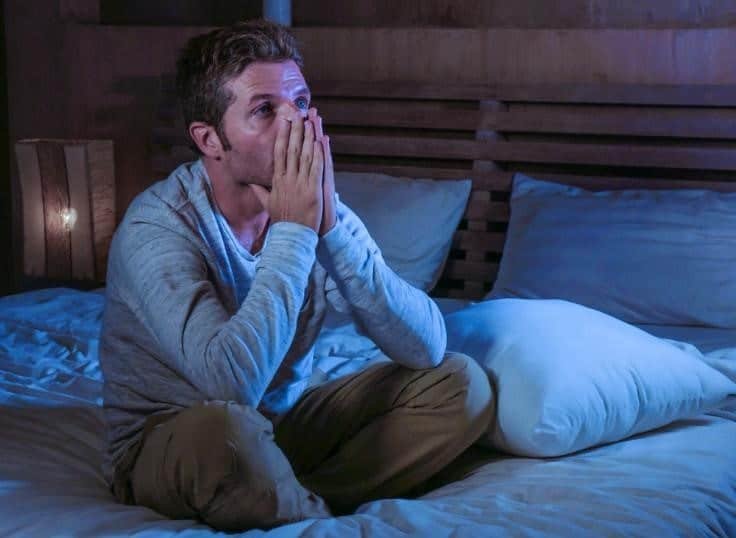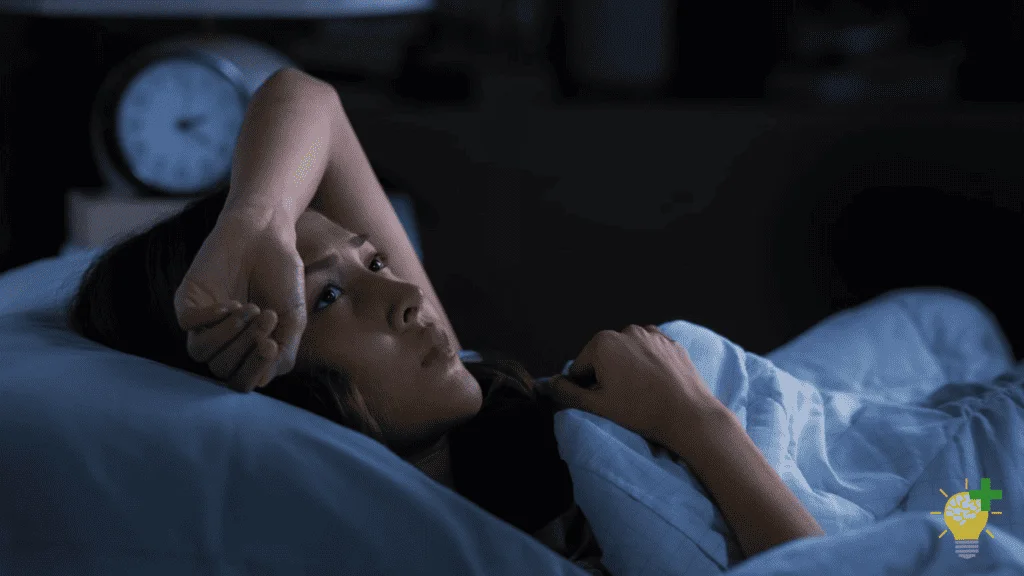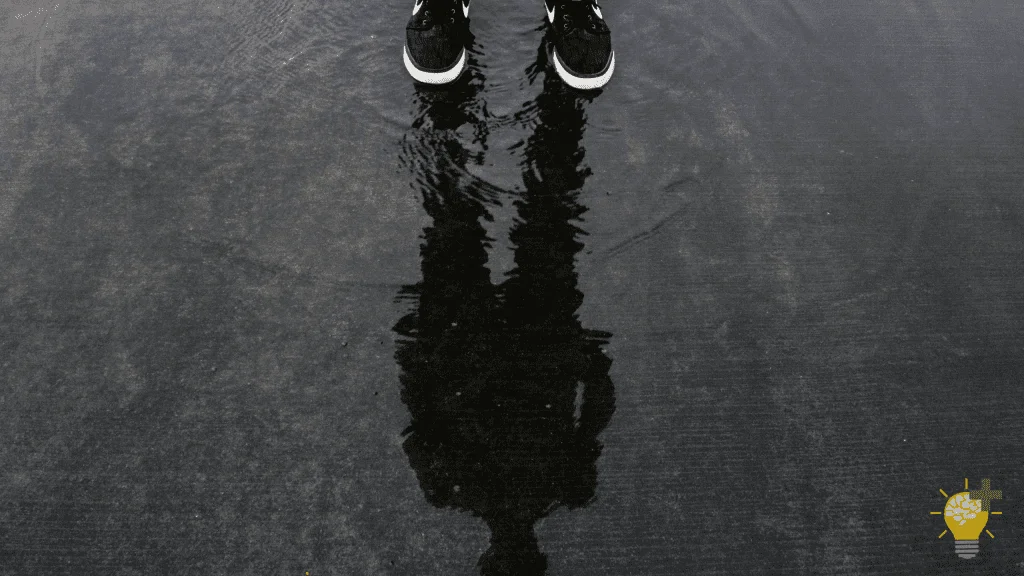Anxiety is a fairly common problem, with about 30% of adults experiencing it at some point in their lives. That said, some people tend to have intense racing thoughts and physical symptoms at night than during the day.
If this is you, it’s normal to wonder, “Why is my anxiety worse at night? Why can’t I have a peaceful night’s rest like other normal people?”Needless to say,this can be very frustrating. Worse still, the experience can take a toll on other areas of your daily life.
Thankfully, you can manage the condition using simple lifestyle changes. I’ll cover that in a bit, but let’s kick things off by understanding why anxiety symptoms feel worse at night.
Understanding Why Anxiety Feels Intense at Night

Like most people with nighttime anxiety, your mind seems to come alive when the lights go out, and you feel completely alone. Suddenly, all your pent-up worries, mistakes, regrets, and flaws creep up on you and keep you tossing late into the night and, sometimes, early morning hours.
Worse still, a restless night’s sleep usually results in exhaustion the following morning, making you irritable during the day and anxious during the night ― a vicious cycle.
Why is anxiety worse at night?
It’s hard to pinpoint the exact reason panic attacks and anxiety feel intense at night. However, it could be due to several factors, such as loneliness. This is especially true when you are very much aware that others are soundly asleep but can’t figure out (for the life of you!) why the natural process eludes you.
Here’s another possible reason anxiety can feel more intense at night.
Support services are often closed at night in many places. Being aware of this can trigger panic attacks or anxiety, considering many people with anxiety need reassurance that help is always available.
Again, nighttime means fewer things to hold your focus and attention ― no flurry of activities to distract your mind. While this is generally good for others, it is usually bad news for you because your mind will somehow dig up worries and anxious thoughts to keep you busy long into the night.
Lifestyle Tips to Ease Anxiety at Night
Nothing can replace working with a professional or using medication for treating or relieving chronic anxiety and the physical symptoms that manifest.
However, staying on top of the problem requires a round-the-clock approach. That’s to say, in addition to professional help, you need to effect certain lifestyle changes to reduce anxiety, especially at night.
The following simple tips can help reduce nighttime anxiety.
Join Support Groups
First, don’t suffer in silence if you experience heightened anxiety, whether during the day or night. Understand that anxiety is nothing to be ashamed of; many people experience at least one form of anxiety disorder. The good news is that many find help because they don’t keep the problem to themselves.
It might be helpful to join an anxiety support group near you where people with anxiety disorders share their experiences and coping strategies.
Some reliable groups include:
- Anxiety and Depression Association of America (ADAA)
- National Alliance on Mental Illness (NAMI)
- Mental Health America (MHA)
Understandably, joining in-person support groups can be quite challenging if you have social anxiety. Not to worry, though. You can join online communities and still get the same support.
Practice Relaxation Exercise
Relaxation exercises are another effective way to manage anxiety at home. Essentially, the technique can help you feel calmer and relaxes your body so you can get some quality sleep.
Some common relaxation exercises include:
- Progressive muscle relaxation: Your body is usually tense when anxiety strikes at night. To release tension and reduce anxiety, deliberately tense the muscles in your body for a few seconds and then consciously relax them. Start from your toes and work your way up to your head.
- Breathing exercises: Breathing slowly and deeply can gradually reduce racing thoughts that keep you up at night. Regularly doing this exercise helps you focus on the things you can control.
- Meditation: If you struggle with nighttime anxiety, I strongly recommend building a habit of meditating right before going to Slumberland. Reducing anxiety is just one of the many benefits you can get from regular meditation.
Find the relaxation exercise or combination of exercises that suit you and practice them regularly. That’s the best way to get the stress reduction and relaxation benefits the exercises offer.
Avoid Consuming Caffeine or Alcohol Close to Your Bedtime
Taking any stimulant close to your usual sleep time is the worst thing you can do if you struggle with nighttime anxiety.
Why is that?
Stimulants like caffeine ― as well as substances like alcohol ― can make you jittery and anxious, especially at night.
According to the National Sleep Foundation, drinking alcohol or caffeine close to your bedtime can mess with your circadian rhythm. If you take any of these substances and still wonder, “Why is my anxiety worse at night?”, now you know why.
Even if you swear by your cup of joe to get you through your day or can’t completely cut out drinking, I strongly recommend staying away from stimulants for several hours before catching some z’s.
Regularly Ground Yourself
Anxiety disconnects you from the present, leaving you stressed over past or future worries. Grounding is a super simple way to stay in the present. The technique is quite simple; it connects you with your environment and the physical sensations in your body. This way, you feel centered and in control, so you can enjoy a restful sleep.
To practice grounding during bedtime, simply engage your senses ― not your thoughts of the past or future. You can:
- Touch or hold an object and focus on the texture
- Smell something pleasant
- Describe something you hear or see
- Take deep breaths and notice the sensation of breathing
- Pay attention to different parts of your body and how they feel
- Repeat some nighttime affirmations to help you fall asleep
Get Organized for the Next Day
Having jumbled thoughts about what the next day will look like can keep you awake long past your usual bedtime.
You can reduce these racing thoughts by preparing for the following day. Planning and preparing for the day ahead helps you feel less overwhelmed by the tasks or responsibilities you need to face.
As you probably guessed, feeling more in control increases the chances of being at ease. This way, you can catch some quality shuteye at night.
How you prepare for the next depends on what’s going on in your mind that’s keeping you awake.
Here are a few ideas you could try:
- Create a detailed to-do list for the next day or week: This approach helps if you have several things to do but don’t seem to have a clear picture of how to complete the tasks. You will likely find it easier to fall asleep once you outline the tasks to be completed and perhaps arrange them in their order of importance.
- Ready the items you’ll need for the next day: Need to make a trip, go for an interview, attend a meeting, or give a presentation? Any of these things can trigger anxious thoughts in most people, and if you have anxiety, it can make sleep difficult at night. To reduce unnecessary worries, prepare the items you need for the following day. Lay out your clothes and pack your bags. Organize your important documents and prepare your speech. You might even want to prepare your meals in advance. Make sure to do these before hitting the sack so your mind is relatively at peace when you go to bed.
- Declutter your space: Research shows that clutter can sometimes make sleep hard to come by, especially if you experience nighttime anxiety. If you can’t sleep because you feel somewhat out of sorts, get up and organize your space.
Put things in order if your bedroom is unkempt with clothes and books strewn all over the floor or your bed is messy. Get rid of unnecessary items in your bedroom to make it more sleep-friendly.
When to Seek Medical Help

Occasional worry at night is normal; it happens to nearly everyone. However, if, after trying the techniques above, you still have reasons to ask, “Why is my anxiety worse at night?” it might be time to reach out to your doctor.
Lifestyle changes may help ease anxiety at night, but it is important to have a chat with your doctor if the symptoms of anxiety are getting in the way of your normal functioning.
There are a handful of professional treatment options available, including:
- Taking medications like antidepressants
- Treating underlying conditions
- Psychotherapy like Cognitive behavioral therapy (CBT)
That said, finding the right treatment for anxiety isn’t always straightforward. It may take a combination of various treatment options to find what works for you.
For this reason, never self-medicate to treat a generalized anxiety disorder. Make sure to speak with your doctor, and together, you can find the best approach for your case.




